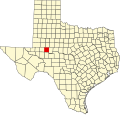Glasscock County Courthouse and Jail | |
 Current 1910 courthouse building | |
 Interactive map showing the location of Glasscock County Courthouse | |
| Location | 117 E. Currie St., Garden City, Texas |
|---|---|
| Coordinates | 31°51′49″N101°28′49″W / 31.86361°N 101.48028°W |
| Area | less than one acre |
| Built | 1894 |
| Built by | Mutual Construction Co., Louisville, Kentucky |
| Architect | L.T. Noyes, Edward C. Hosford, Leslie L. Thurmon |
| Architectural style | Classical Revival |
| NRHP reference No. | 11000129 [1] |
| TSAL No. | 8200003233 |
| RTHL No. | 2188 |
| Significant dates | |
| Added to NRHP | March 21, 2011 |
| Designated TSAL | January 1, 2012 |
| Designated RTHL | 1993 |
The Glasscock County Courthouse is an historic courthouse building located in Garden City, Glasscock County, Texas. Built in 1909 to 1910 at a cost of $28,000, it was designed by Georgia-born American architect Edward Columbus Hosford, who is noted for the courthouses and other buildings that he designed in Florida, Georgia and Texas. It was built of granite and rusticated stone with gable front porticoes on all sides, each of which is supported by four 2-story Doric columns. Unlike the Mason County Courthouse also designed by Hosford and built at the same time for $39,786, the Glasscock County Courthouse has no clock tower cupola in the center of its roof and its side porticoes are smaller than the other two. [2] [3] [4] [5] [6] [7]
Contents
The prior courthouse, a small 2-story stone building, still stands on the property. It was used as a jail after the present courthouse was built but is now closed. [8]




